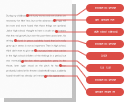《新GRE写作论证论据素材大全》学习类(三)
作者:韦晓亮 来源:极智批改网 2014-04-03
主要论证论据素材包括:学习动机: 目标影响学习方式、量体裁衣的外在奖励、以掌握为导向和以表现为导向、任务导向和自我导向、学习兴趣下降与学习动机、想象力的概念、想象力概述 、想象力和科学假设、科学假设的五大内涵、想象力和信仰之间的区别、好奇心的定义及其起因、如何开始有效学习、学习方法: 非正式学习和正式学习、八大关键学习方法、学习技能的五大方法、自我满意度与学习动力。
33 学习动机: 目标影响学习方式
Motivational theories also explain how learners’ goals affect the way that they engage with
academic tasks. Those who have mastery goals strive to increase their ability and knowledge.
Those who have performance approach goals strive for high grades and seek opportunities to
demonstrate their abilities. Those who have performance avoidance goals are driven by fear of failure and avoid situations where their abilities are exposed. Research has found that mastery
goals are associated with many positive outcomes such as persistence in the face of failure,
preference for challenging tasks, creativity and intrinsic motivation. Performance avoidance goals
are associated with negative outcomes such as poor concentration while studying, disorganized
studying, less self-regulation, shallow information processing and test anxiety. Performance
approach goals are associated with positive outcomes, and some negative outcomes such as an
unwillingness to seek help and shallow information processing.
34 量体裁衣的外在奖励
As stated before, if extrinsic reinforcement is used incorrectly, the students’ enthusiasm and inner
desire to learn can be incapacitated. This undermining occurs because extrinsic rewards create a
dependency between the behavior and the reward. The answer to this problem lies in the nature of
rewards and communications which have either one of two aspects: controlling or informational.
The function of the controlling aspect is to bring about a certain behavioral result that is desired by
the one who is giving the reward. The function of the informational aspect is to provide
information to the recipient that is relevant to their performance. Even though every reward
contains these two aspects, the conveyance of the reward determines its effects on intrinsic
motivation.
In an experiment where two groups of subjects were paid prior to completing a task. One group
was paid controllingly and the other was paid informationally. The group of subjects that were
paid informationally was more intrinsically motivated to complete the task. This experiment
supports the fact that informational reinforcement enhances intrinsic motivation. This idea can
easily be applied to the classroom with use of both tangible and verbal rewards. The important
point from the studies mentioned is that the effect of rewards and communications on intrinsic
motivation depends on whether they are interpreted by the recipients as being primarily
informational or primarily controlling. This application is very important in schools because
rewards and communications are essential parts of educational systems.
35 以掌握为导向和以表现为导向
Mastery orientation is described as a student’s wish to become proficient in a topic to the best of
his or her ability. The student’s sense of satisfaction with the work is not influenced by external
performance indicators such as grades. Mastery orientation is associated with deeper engagement
with the task and greater perseverance in the face of setbacks. Mastery orientation is thought to
increase a student’s intrinsic motivation.
Performance orientation is described as a student’s wish to achieve highly on external indicators of
success, such as grades. The students’ sense of satisfaction is highly influenced by their grades,
and so it is associated with discouragement in the face of low marks. Performance orientation is
also associated with higher states of anxiety. In addition, the desire for high marks increases the
temptation to cheat or to engage in shallow rote-learning instead of deep understanding.
Performance orientation is thought to increase a student’s intrinsic motivation if they perform well,
but to decrease motivation when they perform badly.
36 任务导向和自我导向
A student is described as task-involved when they are interested in the task for its own qualities. This is associated with higher intrinsic motivation. Task-involved students are less threatened by
failure because their own ego is not tied up in the success of the task.
A student who is ego-involved will be seeking to perform the task to boost their own ego, for the praise that completing the task might attract, or because completing the task confirms their own self-concept (e.g, clever, strong, funny etc.). Ego-involved students can become very anxious or discouraged in the face of failure, because such failure challenges their self-concept.
37 学习兴趣下降与学习动机
Inquisitive and self-directed learning is a natural behavior for young children. They marvel at each
new discovery and strive to understand the meaning behind every question in their world.
However, older children seem to be resistant to learning unless directed by teachers or parents
with various forms of external recognition. Their enthusiasm and inner desire for understanding
has diminished. Learning, to older children has become directly connected to demands, controls,
and rewards.
In order to understand why this attitude toward learning develops, the concept of motivation in
education must be defined and examined in a theoretical sense. Motivation is an essential
condition of learning. A motivating condition may be defined as an emotion, desire, physiological
need, or similar impulse that acts as an incitement to action. Ray comments that motivation in
education is concerned with students’ motivation to learn.
With the understanding of these defined concepts in hand, we can begin to examine the reasons
behind school age children losing their enthusiasm for learning. In order to comprehend the reason
for the undermining of this intrinsic behavior, we must acknowledge the basic theories of
motivation from an eclectic standpoint. By embracing the concepts of learning from both a
behaviorist and cognitive point of view, a teacher can tailor the use of reinforcement in the
classroom to commit the students to achieving academic excellence with enthusiasm and devotion.
38 想象力的概念
Imagination is the ability to form mental images, or the ability to spontaneously generate images
within one’s own mind. It helps provide meaning to experience and understanding to knowledge;
it is a fundamental facility through which people make sense of the world, and it also plays a key
role in the learning process. A basic training for imagination is the listening to storytelling(narrative), in which the exactness of the chosen words is the fundamental factor to “evoke
worlds”.
It is accepted as the innate ability and process to invent partial or complete personal realms within
the mind from elements derived from sense perceptions of the shared world. The term is
technically used in psychology for the process of reviving in the mind percepts of objects formerly
given in sense perception. Since this use of the term conflicts with that of ordinary language, somepsychologists have preferred to describe this process as “imaging” or “imagery” or to speak of it
as “reproductive” as opposed to “productive” or “constructive” imagination. Imagined images
are seen with the “mind’s eye”.
One hypothesis for the evolution of human imagination is that it allowed conscious beings to solve
problems (and hence increase an individual’s fitness) by use of mental simulation.
39 想象力概述
The common use of the term “imagination” is for the process of forming in the mind new imageswhich have not been previously experienced, or at least only partially or in different combinations.
Some typical examples are fairy tale and fiction.
A form of verisimilitude often invoked in fantasy and science fiction invites readers to pretend
such stories are true by referring to objects of the mind such as fictional books or years that do not
exist apart from an imaginary world.
Imagination in this sense, not being limited to the acquisition of exact knowledge by the requirements of practical necessity, is, up to a certain point, free from objective restraints. The ability to imagine one’s self in another person’s place is very important to social relations and understanding. (Some psychiatrists suspect this is beyond the grasp of a sociopath. All they know is the gratification of personal pleasure).
In various spheres, however, even imagination is in practice limited: thus a man whose imaginations do violence to the elementary laws of thought, or to the necessary principles of practical possibility, or to the reasonable probabilities of a given case is regarded as insane.
40 想象力和科学假设
The same limitations beset imagination in the field of scientific hypothesis. Progress in scientific
research is due largely to provisional explanations which are constructed by imagination, but such
hypotheses must be framed in relation to previously ascertained facts and in accordance with the
principles of the particular science.
Imagination is an experimental partition of the mind used to create theories and ideas based on
functions. Taking objects from real perceptions, the imagination uses complex IF-functions to
create new or revised ideas. This part of the mind is vital to developing better and easier ways to
accomplish old and new tasks. These experimented ideas can be safely conducted inside a virtual
world and then, if the idea is probable, and the function is true, the idea can be actualized in reality.
Imagination is the key to new development of the mind and can be shared with others, progressing
collectively.
41 科学假设的五大内涵
People refer to a trial solution to a problem as a hypothesis—often called an “educated
guess”—because it provides a suggested solution based on the evidence. Experimenters may test
and reject several hypotheses before solving the problem.
According to Schick and Vaughn, researchers weighing up alternative hypotheses may take into
consideration:
Testability (compare falsifiability as discussed above)
Simplicity (as in the application of “Occam’s Razor”, discouraging the postulation of
excessive numbers of entities)
Scope—the apparent application of the hypothesis to multiple cases of phenomena
Fruitfulness—the prospect that a hypothesis may explain further phenomena in the future
Conservatism—the degree of “fit” with existing recognized knowledge-systems
42 想象力和信仰之间的区别
Imagination differs fundamentally from belief because the subject understands that what is
personally invented by the mind does not necessarily impact the course of action taken in the
apparently shared world while beliefs are part of what one holds as truths about both the shared and personal worlds. The play of imagination, apart from the obvious limitations (e.g. of avoiding explicit self-contradiction), is conditioned only by the general trend of the mind at a given moment. Belief, on the other hand, is immediately related to practical activity: it is perfectly possible to imagine oneself a millionaire, but unless one believes it one does not, therefore, act as such. Belief endeavors to conform to the subject’s experienced conditions or faith in the possibility of those conditions; whereas imagination as such is specifically free. The dividing line between imagination and belief varies widely in different stages of technological development. Thus someone from a primitive culture who is ill frames an ideal reconstruction of the causes of his illness, and attributes it to the hostile magic of an enemy based on faith and tradition rather than science. In ignorance of the science of pathology the subject is satisfied with this explanation, and actually believes in it, sometimes to the point of death, due to what is known as the placebo effect.
43 好奇心的定义及其起因
In essence, “curiosity” is a term that describes an unknown number of behavioral andpsychological mechanisms that have the effect of impelling beings to seek information and
interaction with their natural environment and with other beings in their vicinity.
Curiosity is an innate capability of many living beings, but it can not be subsumed under category
of instinct because it lacks the quality of fixed action pattern; it is rather one of innate basic
emotions because it can be expressed in many flexible ways while instinct is always expressed in a
fixed way, and like any innate capability it confers a survival advantage to certain species, and can
be found in their genomes.
44 如何开始有效学习
Many students find it hard to start working or work for too long when they do. If one finds himself
avoiding starting work or seemingly finding ways out of studying then he should try to start
studying for short periods of 10-15 minutes on a regular basis. This, if done properly, can help
ease one into interrupting your normal daily routine enough to actually get some work done. When
one finds that one can sit and concentrate (which are skills that need to be warmed up by this
process as well) for longer periods then changing to a full study routine is possible.
If one finds that one studies for too long a time, then it can seem much more of a chore than it
really has to be. Even students who really enjoy their subject can end up resenting the amount of
work they have to do if they fall into ineffective study patterns. If this happens one may begin to
fall into the avoiding-starting-to-study pattern.
45 学习方法: 非正式学习和正式学习
Informal learning occurs through the experience of day-to-day situations(for example, one would
learn to look ahead while walking because of the danger inherent in not paying attention to where
one is going). It is learning from life, during a meal at table with parents, play, exploring.
Formal learning is learning that takes place within a teacher-student relationship, such as in a
school system.
Non-formal learning is organized learning outside the formal learning system. For example:
learning by coming together with people with similar interests and exchanging viewpoints, in clubs or in (international) youth organizations, workshops.
The educational system may use a combination of formal, informal, and non-formal learning methods. The UN and EU recognize these different forms of learning. In some schools students can get points that count in the formal-learning systems if they get work done in informal-learning circuits. They may be given time to assist international youth workshops and training courses, on the condition they prepare, contribute, share and can proof this offered valuable new insights, helped to acquire new skills, a place to get experience in organizing, teaching, etc.
46 八大关键学习方法
Some key study skills include:
Removing distractions and improving concentration
Maintaining a balance between homework and other activities
Reducing stress, such as that caused by test anxiety
Strategies for writing essays
Speed reading
Note-taking
Subject-specific study strategies
Preparing for exams
47 学习技能的五大方法
In order to learn a skill, such as solving a Rubik’s cube quickly, several factors come into play at
once:
Directions help one learn the patterns of solving a Rubik’s cube.
Practicing the moves repeatedly and for extended time helps with “muscle memory” and
therefore speed.
3. Thinking critically about moves helps find shortcuts, which in turn helps to speed up future
attempts.
The Rubik’s cube’s six colors help anchor solving it within the head.
Occasionally revisiting the cube helps prevent loss of skill.
48 自我满意度与学习动力
Research on learning has indicated that in certain circumstances, having less self-efficacy for a
subject may be helpful, while more negative attitudes towards how quickly/well one will learn,
can actually prove of benefit. One study uses the foreign language classroom to examine students’beliefs about learning, perceptions of goal attainment, and motivation to continue language study.
Survey and interview results indicated students’ attributions for success and failure and their
expectations for certain subjects’ learning ability played a role in the relationship between goal
attainment and volition. It appears that over-efficaciousness negatively affected student motivation.
For other students who felt they were “bad at languages,” their negative beliefs increased their
motivation to study.
批改及润色体验馆 想知道您的作文、口语、文书将如何被我们的专家批改及润色吗? 查看更多
 马上体验口语批改
马上体验口语批改
 马上体验作文批改
马上体验作文批改
 马上体验文书润色
马上体验文书润色
作文题库:
托福-综合写作 托福-独立写作 雅思-小作文 雅思-大作文 GRE-Issue GRE-Argument GMAT-Argument SAT-Essay ACT-McGraw-Hill ACT-历年代表性作文题目考研-小作文 考研-大作文 四级-作文 六级-作文 专四-大作文 专四-小作文 专八-作文 高考-新课标一 高考-新课标二 高考-北京 高考-天津 高考-广东 高考-四川 高考-辽宁 高考-安徽 高考-福建 高考-湖南 高考-湖北 高考-陕西 高考-浙江 高考-山东 高考-上海 高考-重庆 高考-江苏 高考-江西 高考-杭州外国语学校 高考-郑州四中 高考-章丘
口语题库:
托福-Question 1 托福-Question 2 托福-Question 3 托福-Question 4 托福-Question 5 托福-Question 6 雅思-Part 1 雅思-Part 2 雅思-Part 3求职面试-500强企业高频通用英文面试题目100道 求职面试-各大企业常用场景英文面试题目
签证面签-你是谁 签证面签-你去做什么 签证面签-你有能力去做吗 签证面签-你会回来吗
留学面试-关于学校及专业 高考-高考口语
文书润色:
留学文书 学术论文 商务文书 求职文书 课程作业 书稿润色 学术论文试用 学术论文摘要文章推荐
- 《新GRE写作论证论据素材大全》艺术类(二)
- 《新GRE写作论证论据素材大全》艺术类(三)
- 《新GRE写作论证论据素材大全》艺术类(一)
- 《新GRE写作论证论据素材大全》文化类(三)
- 《新GRE写作论证论据素材大全》文化类(二)
- 《新GRE写作论证论据素材大全》文化类(一)
- 《新GRE写作论证论据素材大全》政治类(二)
- 《新GRE写作论证论据素材大全》政治类(一)
- 《新GRE写作论证论据素材大全》学习类(四)
- 《新GRE写作论证论据素材大全》学习类(三)
- 《新GRE写作论证论据素材大全》学习类(二)
- 《新GRE写作论证论据素材大全》学习类(一)
- GRE Argument 168 范文+逐段点评+全篇总评
- 《新GRE写作论证论据素材大全》科技类(三)
- GRE Argument 152 范文+逐段点评+全篇总评
- GRE Argument 160 范文+逐段点评+全篇总评
- 《新GRE写作论证论据素材大全》科技类(二)
- GRE Argument 135 范文+逐段点评+全篇总评
- GRE Issue 104 (107) 范文+逐段点评+全篇总评
- 《新GRE写作论证论据素材大全》科技类(一)
- GRE Argument 132 范文+逐段点评+全篇总评
- 《新GRE写作论证论据素材大全》教育类(三)
- GRE Issue 123 范文+逐段点评+全篇总评
- GRE Argument 142 范文+逐段点评+全篇总评
- 《新GRE写作论证论据素材大全》教育类(二)
- GRE Issue 143 范文+逐段点评+全篇总评
- GRE Argument 170 范文+逐段点评+全篇总评
- 新GRE写作论证论据素材大全》教育类(一)
- GRE Issue 114 范文+逐段点评+全篇总评
- 【GRE Argument 113 范文+逐段点评+全篇总评】
- 《新GRE写作论证论据素材大全》行为类(三)
- GRE Issue 101 范文+逐段点评+全篇总评
- GRE Argument 109-110 范文+逐段点评+全篇总评
- 《新GRE写作论证论据素材大全》行为类(二)
- GRE Issue 89 范文+逐段点评+全篇总评
- GRE Argument 101 范文+逐段点评+全篇总评
- 《新GRE写作论证论据素材大全》行为类(一)
- 《新GRE写作论证论据素材大全》社会发展类三
- 《新GRE写作论证论据素材大全》社会发展类二
- GRE Argument10范文+逐段点评+全篇总评
- GRE Issue8范文+逐段点评+全篇总评
- GRE Issue13范文+逐段点评+全篇总评
- GRE Argument8范文+逐段点评+全篇总评
- GRE Issue7范文+逐段点评+全篇总评
- GRE Issue4范文+逐段点评+全篇总评

使用有问题?请联系我们的在线专家
工作时间:09:00AM - 08:00PM
 专家在线
专家在线





